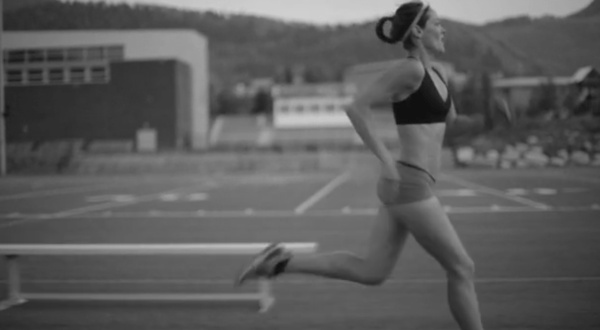Outside Voices has all the classic indie-film elements: shaky camera, lens flare, blurry shots, and odd angles. The viewer is treated to long looks at seemingly unrelated things like powerlines, sprinklers, and the sun. Many of the shots are long and awkward–main subject Jenn Shelton seems to be tolerating the camera as much as filmmaker Joel Wolpert seems to be impatiently awaiting the right shot. Many of the shots are crafted so that the viewer is very clear about where the cameraman is, whether he can’t quite push through a crowd or horsemen on the trail are looking at him instead of Jenn as they pass. Above all, the entire film is in black and white, which gives an impression of rawness. Combined with the rough transitions and almost painful shots of Jenn doing mundane things, the film wants to be a mirror of Jenn herself. It tries to echo her.
The film does not have a conventional story arc, if it even has one at all. Instead, it’s a montage of snapshots of the life of Jenn Shelton. It’s the story of lonely girl putting one foot in front of the other. She parties and travels to see the world and have fun. She talks to everyone. She smiles when she’s sad because crying doesn’t help. She runs when she’s unsure of what to do because that’s what she has always done, it’s what is simple and obvious and as rewarding as anything else. The second half of the film is about Jenn running the Bear 100 Mile, but it’s hard to tell where she is in the race or how it’s going, which like all the other seemingly unnecessary aspects of this movie must have been done deliberately by Wolpert. The race is a metaphor for her life, and she slips through it without clear demarcation the same way she fears growing older without anything real to hold onto. Outside Voices is a sad movie, but don’t pity Jenn. She doesn’t want sympathy… from everyone. She’s vulnerable not to attract attention but because it’s the way she really felt when they were filming. And if I can say one absolutely true thing about Jenn, it’s that she is genuine.

Jenn Shelton in ‘Outside Voices.’ Image is a screenshot from the film.
Given that a lot of the film’s sadness seems to revolve around aging and time, we’re given very few indicators of time within the film. Just flashes of Jenn’s reality–eating from a cup in the back of her van; laughing while playing cards; driving somewhere new; and best of all–running. I hold a strong conviction that watching running on film is super boring, but Wolpert does a very good job to convince me otherwise in Outside Voices. The most enjoyable parts of the movie are the gorgeous shots of her running along trails in the mountains. Here the camera is as smooth and clear as Jenn’s stride, and we get to enjoy secondhand the simplicity of running. Many of these shots are overtly sexualized, but in contrast the only part where she’s actually topless is one of the least sexual parts of the movie. The movie features many contrasts: she’s shown offering mezcal to people racing 100 miles; she talks about recovering from long runs by eating Taco Bell; the title refers to her spending so much time outside to yell and cuss, but she spends a lot more time being quiet and sarcastic; and at the end of this movie that’s all about her life, she tells us we don’t know her at all.
Jenn can be a polarizing individual. Her reputation is that of the wild and crazy party girl. The book Born to Run crafted her into the anti-heroine who reads poetry and runs all day long; she drinks and parties harder than anyone, yet she’s up training by dawn; she gets into fights and resists authority. She has built (or other people have built for her) the quintessential image of the young rebel bucking tradition. Fiercely independent and truly herself, she’s vocal and irreverent and beautiful. The world loves a rebel, and all the more if she’s pretty. Best of all, she’s fast, and offers a way to be successful and have fun at the same time, without all the boring drudgery of convention. By this point it doesn’t matter if any of that is true or not–the fact of the reputation has become an undeniable influence on her and all the people around her. This is why the world pays attention to her, although it’s only one part of her.
Jenn’s reputation certainly precedes her. When we first met I wanted to be able to relate to her–I wanted her to like me–and I felt almost obligated to be wild and loud and irreverent just to keep up with her. I felt that way because of all the things I’d heard of her. I had a clear image of who she was before I even met her, which is unfair but probably normal to people in the public eye. Her reputation is in many ways a caricature of her reality–the wild parts are cartoonishly exaggerated while the quiet, sad, thoughtful parts of her are downplayed or ignored entirely. She embellishes her own legend as much as anyone, seeming almost embarrassed to show people her gentle sides. Over time I saw the fusion of two parts of her: the wild, loud, silly side fueled by the inner desire for childlike simplicity and awe in nature. It took me a long time to realize that acting like Jenn will not earn her respect unless you really are like her, because she likes and respects people who are completely and truly themselves. The point here, though, is that I did want her to like me. She might polarize people and get into fights, but we can’t stop watching her.
Don’t let me talk her up too much. Jenn has done some stupid things. I’ve seen her insult people she has never met. I’ve seen her scream “the patriarchy” while being arrested; I’ve seen her wish evil things upon people she loved. She is deeply flawed and she knows it. But no more than anyone else. She’s just more vocal about everything she does than most people. Whatever she is, she can’t be wrapped up in a 1,000-word article or a 45-minute film or probably anything at all except a warm blanket. Outside Voices tries to capture this paradox, and succeeds about as well as any story could, which is probably why it sometimes seems to be about nothing at all. This film is about a person whose life revolves around running and adventuring in the mountains, which is the ideal for a lot of people. But you see a lot more mundane nonsense in this film than glorious hero-shots. And that’s what makes it as real as Jenn herself. You should watch the movie.
Call for Comments (from Meghan)
Have you watched Outside Voices? What was your takeaway from the experience of watching scenes from a summer of Jenn Shelton’s life? And what were your thoughts on Joel Wolpert’s unusual-for-trail-running-filmmaking techniques?
